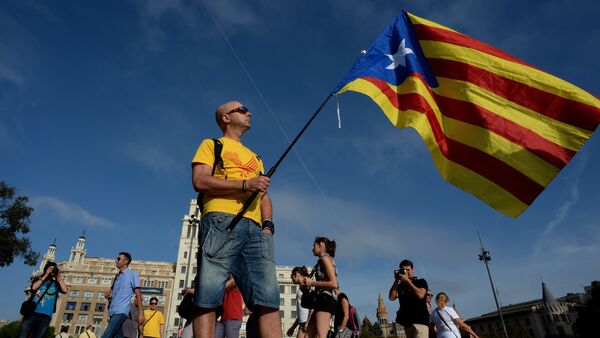MOSCOW, November 9 (RIA Novosti) —On November 9, Spain's northeastern Catalonia region is holding an unofficial independence consultation. More than 5.4 million of the region's official residents aged 16 and older are eligible to participate in the vote, designed to shape Catalonia's future.
Catalonia (Catalunya) is an autonomous region of Spain, located in the northeast of the Iberian Peninsula. Catalonia is bordered by the regions of Aragon to the west and Valencia to the south, as well as France to the north. The northern border runs along the Pyrenees.
The region's area is 32,106 square kilometers.
Catalonia is home to 7.5 million people, 15% of the population of Spain.
The region's official languages are Catalan, Spanish, and Aran (in the Val d'Aran).
Its capital, Barcelona, is the second largest city in Spain.
Catalonia includes the provinces of Lleida, Andorra, Girona, Barcelona and Tarragona.
The name Catalonia first appeared in the first half of the 12th century to refer to the lands of the County of Barcelona. In 1137, this county merged with the Kingdom of Aragon. Since 1479, it has been an autonomous province of Spain. Catalonia maintained relative independence until 1714, when Philip V ascended to the Spanish throne and severely curtailed Barcelona's freedoms. Catalans began to fight for the establishment of an independent state in the mid18th century. In 1871, the region nearly broke away from Spain, but negotiations with Madrid cooled separatist sentiment. Another attempt at independence was made in 1930, but the Catalans were outmatched by Franco's forces. Franco's victory led to the de facto end of the province's autonomy and the suppression of the movement for nationhood.
After Franco's death in 1977, the region was granted limited autonomy. In 1979, Catalonia was granted autonomy (the framework for self-rule in Catalonia was established by the Regulations on Autonomy), which was followed by official recognition of the Catalan language.
In 2006, Catalonia gained greater financial autonomy.
In 2009-2010, informal surveys on Catalan independence were held in which 90% of the population chose independence.
In September 2012, 1.5 million people demonstrated for independence throughout Catalonia under the slogan "Catalonia – a new nation of Europe."
Independence supporters won an absolute majority in the Parliament of Catalonia in the November 2012 regional elections, and on January 23, 2013 parliament passed the Declaration of Sovereignty
In January 2014, a majority in the parliament of Catalonia voted to hold a referendum on independence from Spain. Spain's Constitutional Court declared the vote illegal. Under the Constitution, any vote on Catalonia independence must be put to all Spaniards. On April 9, the Spanish parliament voted against holding a referendum in Catalonia.
On September 19, the parliament of Catalonia passed a law, which, according to local authorities, allows Catalonia to hold national polls without Madrid's formal consent.
On September 27, Catalonian leader Artur Mas signed a decree to hold a referendum on independence on November 9.
On September 29, the Constitutional Court of Spain agreed to hear the government's challenge to the decree and the Sept. 19 law, which automatically suspended both.
The Catalonian government initially said it would abide by the court's decision, but then backed out and began preparing for the referendum, creating an electoral commission.
On October 14, Catalonian authorities recognized that they lacked authority to hold a referendum under the decree signed by Artur Mas, and began looking for alternatives.
The government of Catalonia decided to hold a non-binding vote on independence on November 9. But the question put to the voters is the same as the planned referendum: "Do you want Catalonia to become a state?" and "If so, do you want Catalonia to become an independent country?" Preliminary results will be announced on November 10. All Catalonian residents over the age of 16 will be able to take part in the vote.
Catalonia is one of the most economically advanced regions of Spain, with the highest regional GDP – 203 billion euros in 2013. Regional GDP is almost 20 percent of the national total, while Catalan industry accounts for a quarter of total production in Spain.
Some 20 percent of Catalonian businesses are exporters. Catalonia is home to 30 percent of exporting companies in Spain and accounts for almost 31 percent of total exports.
The region's exports totaled 58.4 billion euros in 2013.
Main exports are chemical and pharmaceutical products (25 percent), automotive products (17 percent), food and beverages (11 percent).
Catalonia continues to be a popular destination for foreign direct investment. Catalonia currently hosts over 3,300 foreign companies, while over 5,700 companies incorporated in the region have foreign shareholders.
Catalonia also has a thriving tourism business. In 2013, 15.6 million people visited, spending 14 billion euros.
More than seven million people visited Catalonia in the first six months of 2014.


